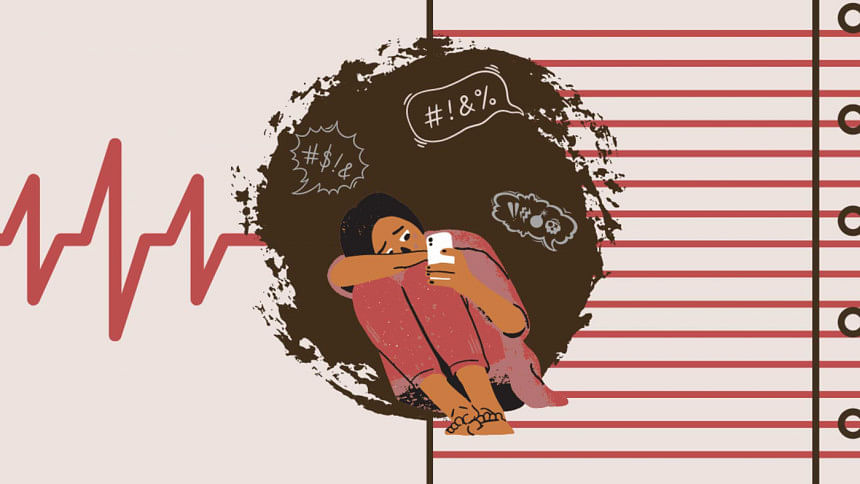Our apathy towards the suicide epidemic

Every death is a tragedy, but when a young life is cut short, there is almost always a deeper level of empathy, a shared commiseration at the sadness of a life not lived. However, it's troubling how this empathy vanishes completely when that life is taken away by suicide—replaced by a wave of judgement, it shows a complete lack of understanding of the mental health issues that could drive one to take their own life.
On Sunday, March 13, 2022, a 16-year-old student from Mymensingh reportedly died of suicide. Before doing so, she wrote a Facebook post about her mental state, detailing how she had been suicidal for three years, had received no support and was now in a place where she was having physical reactions to her trauma and felt that death was the only escape. Her story has already been sensationalised on social media enough, so I will keep the details to a minimum. What I want to focus on are some of her final words, "You have no idea how much mental pressure a person has to feel to want to die willingly… don't come here to judge me. If someone asks for help, all you can do is bully. But when they do something, it is their fault. Have you learnt anything in life except victim-blaming?" (translated).
She displayed a great deal of foresight in writing this, since her assumption of being judged and bullied even after death turned out to be perfectly accurate. Her social media is flooded with comments, ranging from how selfish she is, how she will go to hell, how "dirty feminists" deserve to die (in her suicide note, she spoke of the restrictions she faced as a female in a patriarchal society), and even jokes about how she's finally getting the attention she craved. And, of course, comments about her body and her face—page after page of filth written at the expense of a dead teenager, apparently "undeserving of sympathy" because her death was a "choice."
As I scrolled through these comments, I was appalled to realise that we live in a society where its members have so little empathy for the dead, and disrespect religious beliefs enough to use it as an excuse to publicly condemn—and even celebrate—the death of a minor. But then I came across a comment that stopped me in my tracks. A young woman wrote, "I have resisted committing suicide thinking that people might miss me, but now that I see all the comments here, I feel like it won't matter, everyone will clearly hate me anyway" (paraphrased).
Sometimes, it's easy to forget that the cruel bullies with too much time on their hands and too little self-respect are the loudest and the most vicious voices on social media. We need to have a much-needed (and much longer) conversation about what we have done wrong as a society that these people exist in the first place—and why they hate women so much that any reference to gender inequality makes them wish death and destruction upon their fellow human beings. But what we need to remember right now is that many people who don't agree with the trolls, and who often are on the receiving end of their attacks, are suffering in silence.
The Bangladesh Bureau of Statistics (BBS) estimate that around 10,000 suicides occur in the country every year. Last year, a youth-led organisation found that between March 2020 and February 2021, 14,436 people died by suicide in the country. And it's likely that these numbers are grossly underreported due to the stigma surrounding suicide. How many people are contemplating suicide, right now, as I write this? And what views are they being exposed to, other than the ones shouting at them from their screens, telling them that they deserve to die because they don't know how to appreciate life? Is anyone talking to them, listening to them and providing them with the support they need?
In all the reports I found on the schoolgirl from Mymensingh, teachers, lawyers, police representatives and ordinary citizens shared their opinions on what went wrong in her life. Almost all of them referred to the importance of good parenting, with little explanation of what that entails, and none of them used the two most crucial words here: mental health.
The fact that suicide is a culmination of depression, mental illness, traumatic stress, hopelessness, social isolation and a number of other factors is completely lost upon us. But where the general public fails, our institutions must show us the way. So where are the educators, the community leaders and the elected representatives talking about suicide—not as a crime or a shameful act, but the tragic result of severe mental health issues that we have wilfully chosen to ignore? Where are the available resources on suicide prevention, the national suicide helpline, and the honest and inclusive conversations on the pressure that people face in society today?
Research done on mental health in other countries tells us that suicide is not inevitable. If a person living with suicidal thoughts is listened to and their feelings validated, the knowledge that someone cares can make them feel less trapped. In other words, a better societal understanding of mental health and depression, and appropriate support structures can save lives. But before any of that can happen, we need to seriously reflect on the lack of humanity hiding behind the excuse of "personal beliefs" that prevents so many from feeling any empathy for a life ended abruptly by depression and mental illness.
Shuprova Tasneem is a member of the editorial team at The Daily Star.

 For all latest news, follow The Daily Star's Google News channel.
For all latest news, follow The Daily Star's Google News channel. 



Comments